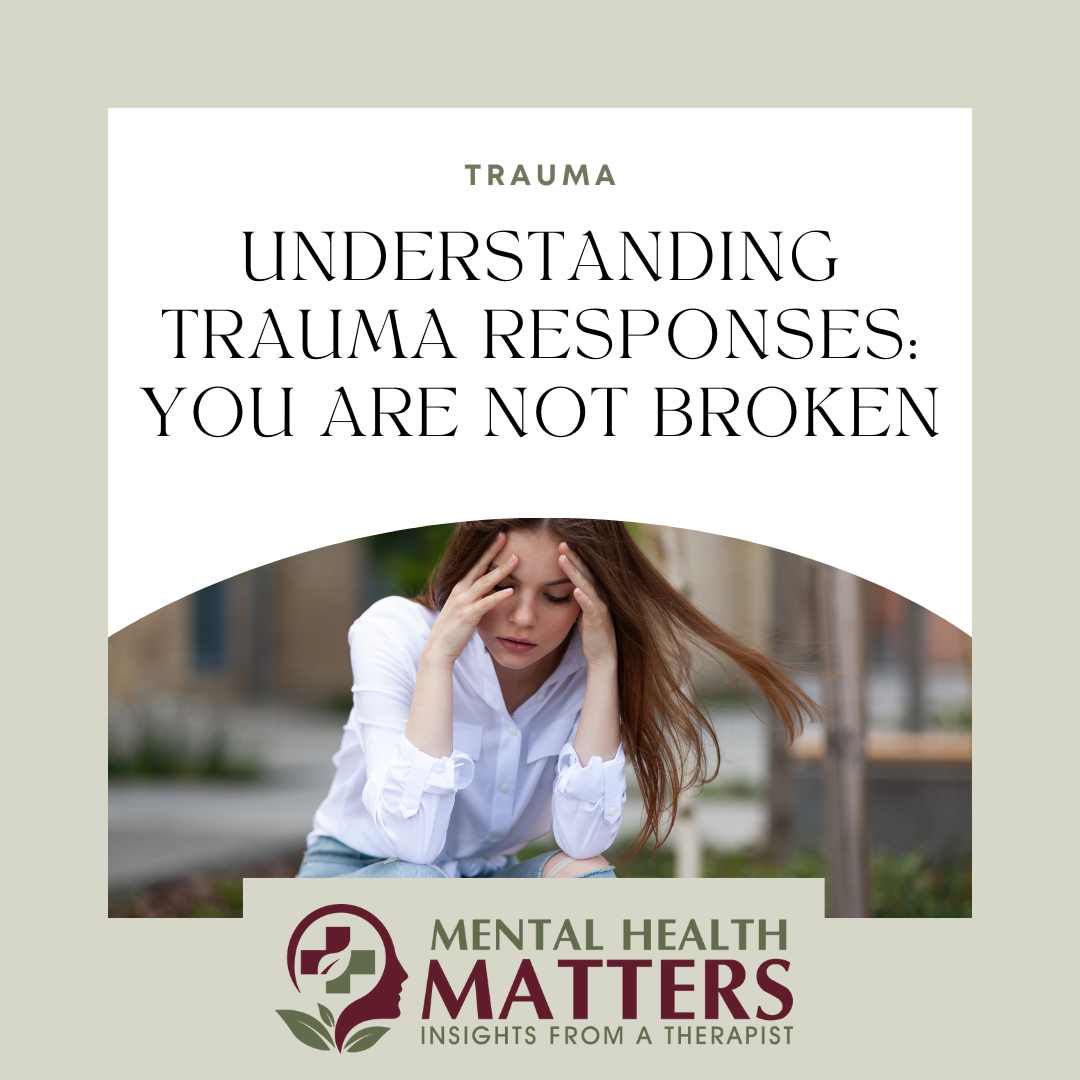Understanding Trauma Responses: You Are Not Broken
In the quiet corners of our minds, where thoughts swirl and emotions brew, there's often a whisper, a gentle yet persistent murmur, suggesting that we're somehow 'broken.' Especially in the aftermath of a traumatic event, when our reactions can range from torrents of tears to an unsettling numbness, it's all too easy to start believing that whisper. As a mental health therapist dedicated to demystifying the complexities of the human psyche, I'm here to reassure you: You are not broken. Your reactions, whatever they may be, are normal responses to abnormal events. In this post, we'll explore the intricate tapestry of trauma responses, understanding why your reaction, even if it's no reaction, is a testament to your resilience, not a sign of being broken.
You Are Not Broken: Navigating the Labyrinth of Trauma Responses
In the serene sanctuary of my therapy room, I've journeyed alongside countless souls, each grappling with the aftermath of their unique traumas. Through whispered confessions and eyes brimming with unshed tears, one theme recurrently echoes: "Am I broken?" It's a heart-wrenching question born from the deepest recesses of self-doubt, often whispered in moments of vulnerability. But as we gently unfurl the layers of your experiences and emotions, a universal truth emerges – your reactions to trauma, in their myriad forms, are not signs of brokenness but of undeniable strength.
Understanding Trauma: A Collision with the Abnormal
Trauma, in its most unadorned definition, is a response to an event or series of events that overwhelm your usual capacity to cope. It's the psyche's alarm bell, signaling that what you've encountered is far from the realm of 'normal.' When faced with such profound disturbances, your mind and body choreograph a dance of survival, often manifesting in ways you might not anticipate or understand.
The Spectrum of Responses: There's No 'Right' Way to React
Trauma responses are as diverse as the human tapestry itself. Some may find themselves ensnared in the clutches of anxiety and fear, while others might retreat into a shell of numbness or detachment. Here's the cornerstone of our understanding: neither of these reactions nor the myriad others, signify that you are broken. They are your inner self's attempt to protect you, to navigate through the stormy seas of post-traumatic stress.
The Emotional Whirlwind: You might find tears come easily, or anger flares unexpectedly. Emotions can feel magnified, each one a vivid stroke on the canvas of your daily life.
The Quiet Numbness: For others, emotions may retreat, leaving a void where feelings once ebbed and flowed. This isn't a sign of being unfeeling or disconnected; it's a psychological defense mechanism, a buffer against the intensity of trauma.
Physical Echoes: Trauma can also manifest physically – a racing heart, a sudden chill, or an inexplicable fatigue. These are not signs of weakness but of your body speaking its language of distress.
The Path to Healing: Acknowledging and Accepting Your Response
Healing begins the moment you acknowledge and accept your response to trauma. It's about gently holding space for your feelings, allowing them to exist without judgment. Here's how you can start this journey:
Self-Compassion: Treat yourself with the same kindness you would offer a dear friend. Your reactions are valid, and they deserve compassion, not criticism.
Seek Understanding: Delve into the roots of your reactions. Whether through therapy, journaling, or mindful reflection, understanding your responses is a stride toward reclaiming your power.
Foster Connections: Lean on the support of loved ones or join support groups. Sharing your story can be both healing for you and illuminating for others.
The Therapist's Reminder: You Are Whole, Not Broken
As we navigate the intricacies of trauma together, I offer you this gentle reminder: you are whole, even in your moments of doubt. Your reactions, however bewildering they may seem, are the threads of your resilience, woven through the fabric of your being. You're not broken; you're human, beautifully complex, and profoundly resilient.
In the quiet after the storm, as you piece together your narrative, remember this: your response to trauma is your strength speaking in whispers, a testament to your ability to endure and evolve. So, dear reader, let's shift the narrative. Let's embrace our responses, not as evidence of brokenness, but as symbols of our unyielding strength and our capacity to heal.
Embracing Your Journey
As we bring this conversation to a close, I would like you to carry these insights with you. Your journey through trauma and healing is profoundly personal, but you don't have to walk it alone. Reach out, seek support, and remember, in the realm of healing and growth, you are an ever-evolving masterpiece, whole and resplendent, just as you are.
Remember, in the vast mosaic of human experience, each piece, each reaction, and each emotion, however it may manifest, holds its rightful place. You are not broken; you are simply navigating the labyrinth of the human experience, with resilience as your compass and hope as your guide.
If you find yourself seeking a companion on this journey, remember, the door to understanding, support, and compassion is always open. Your reactions, your feelings, and your story are valid, and in the grand tapestry of life, they form the unique and irreplaceable pattern that is you.


